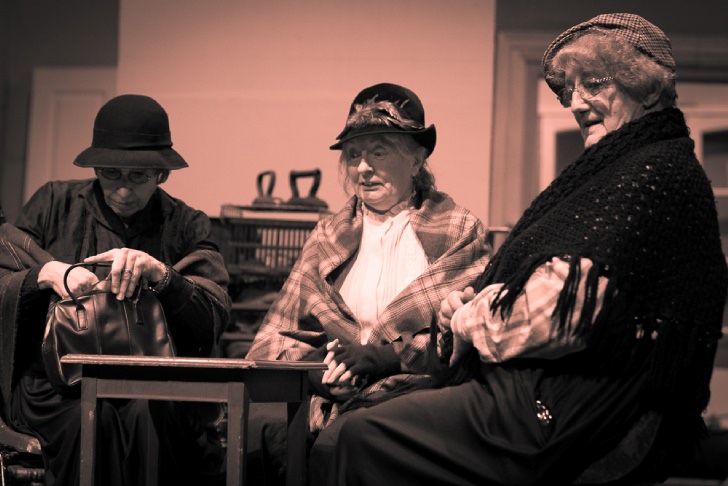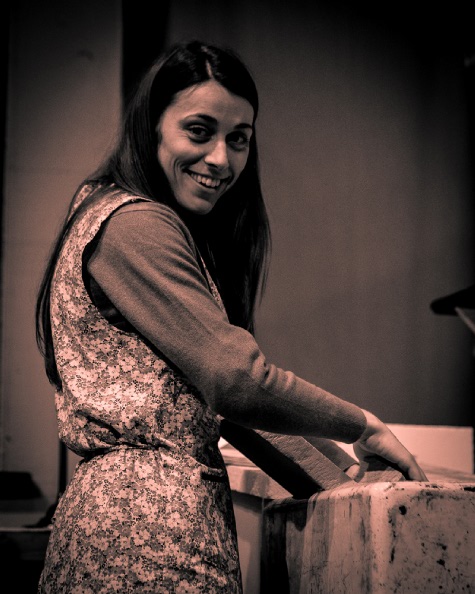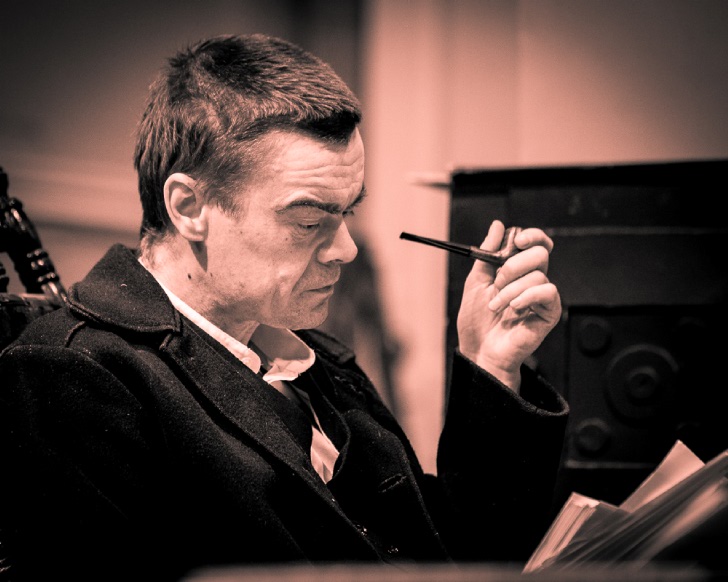Means test, marriage and misery

When shall we three meet again . . .
Jean Hulme as Mrs Dorbell, Ann Hickman as Mrs Jike and Carol
Ashby as Mrs Bull
Love on the Dole
Hall Green Little Theatre
****
SALFORD, cheek
by jowl with Manchester, was the setting for Harold Brighouse’s
Hobson’s Choice
in the 1880s and 50 years later another of the city’s famous sons Walter
Greenwood, wrote about it in
Love on the Dole
in 1933.
His novel about the grinding poverty of the
1930’s depression, is set in the Hanky Park area of Pendleton where
Greenwood was born, an area which in less than a hundred years had gone
to fields and orchards to steam powered mills and slums crammed with low
paid workers with little or no employment protection, dole of 15 bob a
week (75p) which could be stopped an the slightest excuse and poor
relief for the destitute at five bob a week (25p).
When the great depression hit, unemployment,
already high, soared. Poverty became a way of life with people homeless
and starving.
It was into that world that Greenwood introduced
the Hardcastle family brought to the stage, at Manchester Rep, in 1934
by Raymond Gow. Two touring versions of the play criss-crossed the
country, appearing in cinemas in towns with no theatre, and by the end
of 1935 upwards of a million people had seen it.
With the welfare state its impact has lessened
today and the life of poverty and deprivation has become historical
rather than contemporary but this Hall Green production brings that
history to life in a fine production.
Having been born and brought up within 10 miles
of Hanky Park it was easy to detect some of the accents were a little
awry but to a non-Lancastrian they would be passable Northern tone s,
helped by South East Lanky words such as Skrykin (crying and moaning)
and Clem (starve). s,
helped by South East Lanky words such as Skrykin (crying and moaning)
and Clem (starve).
Colette Hampton as Sally Hardcastle is our
heroine in all this, in work she ends up keeping her entire family with
brother Harry, played with boyish enthusiasm by Ryan Knight, and father,
played with a humourless mix of shame and scowl by Richard Woodward,
both out of work.
Mrs Hardcastle, played with a worried frown by
Mandy Yeomans, takes in washing to help out finances and keeps all the
money, including her husband’s pay packet when he was working,
handed over unopened, in separate
containers for separate bills, on a shelf over the range.
Colette Hampton as Sally whose dreams are slowly
crushed under the weight of poverty
Hampton allows us to see Sally grow, or perhaps,
more accurately, see her ground down from the young, idealistic girl, in love
with political agitator Larry Meath, dreaming of a bright future, to the
cynical good-time, or hopefully bit-better-time girl at the end.
Her fiancée is dead, every penny she earns
vanishes into keeping her parents and brother, she has nothing to show
for her labour and the offer of housekeeper to rich and repulsive
illegal bookie Sam Grundy, played with suitable paunch and arrogance by
Matt Ludlum, seems a more attractive offer.
She is told it is her own bed she is making and
she will have to lie on it, probably literally as part of the job in
this case, but at least it will be a comfortable bed with clean sheets,
and she will be well paid for her trouble with jobs for her father and
brother at the local bus depot thrown in.
It is a last resort and the audience, if not her
family, know it. As she says: “Love at the pictures is all right but
love on the dole is not the same thing”.
Larry, played with a sort of student
revolutionary zeal by Callum Davies, was fated from the start. He
obviously was suffering from the consumption which was was endemic amid
the unsanitary, damp housing, he had unwittingly run foul of the
powerful Grundy by being the fiancé of Sally, and his luck, if he
actually had any beyond Sally, finally ran out as he was trying to
protect a march by the National Unemployed Workers’ Movement as they
marched to Salford Town Hall to present a petition to the council about
the means test and cuts in the dole.
The police waded in attacking and arresting as
they went. Similar police brutality around the country ended with the
formation of the National Council for Civil Liberties when 75 workers
were seriously injured at a demonstration in London. Problems for the
Hardcastles were never ending though. Harry had managed to get his
girlfriend Helen, played with a quiet subservience by Rachel Louise
Pickard, pregnant.
Morality was strong in working class Hanky Park,
no hanky panky there, so her family threw her out and when Harry
 was
banished as well, with no job and no dole, he and Helen and his new baby
were reduced to the workhouse. Harry had a great line in chat-up though –
“You’re not exactly Greta Garbo but you’ll do.” was
banished as well, with no job and no dole, he and Helen and his new baby
were reduced to the workhouse. Harry had a great line in chat-up though –
“You’re not exactly Greta Garbo but you’ll do.”
Bringing some light relief to the play are the
three old biddies who seem to spend their lives supping gin and
gossiping. Interfering when they can, relaying any local scandal or
tittle tattle, filling in the gaps with little more than imagination
when necessary.
Richard Woodward, last seen as the lodger in The
Birthday Party, as the gruff Mr Hardcastle trying to remain master of
his own crumbling house.
Mrs Bull, Carol Ashby, Mrs Dorbell, Jean Hulme
and Mrs Jike, part-time tea leaf reader, spiritualist and medium, played
by Ann Hickman, are a delight. A bit like Thora Hird and her tea
swilling cronies in Last of the Summer Wine, they have an opinion
on everything with such observations as “A woman isn’t a woman until
she’s been in childbirth 10 times, not counting miscarriages”. They put
enough oars in to leave any conversation looking like a Roman galley!
Roy Palmer’s direction keeps what can be a slow
moving play, marching along at a decent pace and his use of four stage
blocks provides both interest and an imaginative start as an empty stage
is suddenly populated by the entire cast of 15 bringing in the set.
And what a set. Theatre is about magic, smoke and
mirrors, and Palmer has managed a set which looks and feels authentic
down to a dolly tub and dollies, an old copper boiler in a brick housing
(Palmer is not the king of polystyrene for nothing) and a huge cast iron
black leaded grate and range.
We even have a Belfast sink with working antique
taps and a guzunder sitting in the corner.
Turn them around and we have a plain brick wall
broken by a window complete with a donkey stoned sill and even a back
passage between back to backs to lurk in.
Costumes, courtesy of Jean Wilde and Carmen
Burkett again look authentic all adding to what is an excellent
production of an important and, in its time, influential play. To
05-04-14.
Roger Clarke
|

